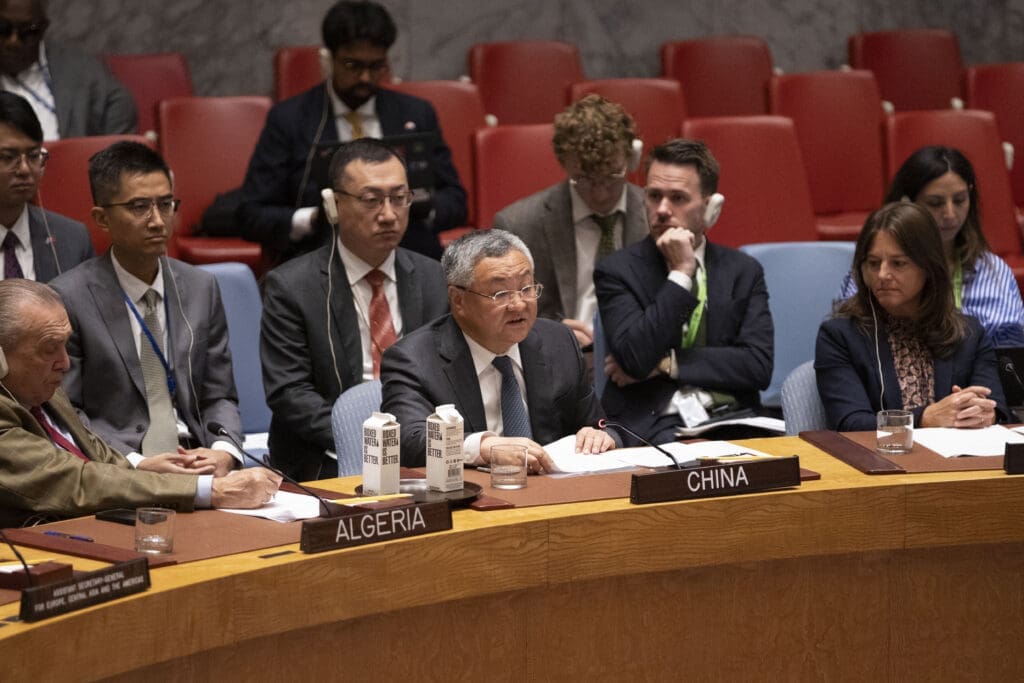For decades, China and Israel have maintained a relatively strong and pragmatic relationship, grounded in extensive trade and technological cooperation. Yet after two years of Israeli devastation in Gaza, along with its broader military operations across the Middle East, it is clear that Israel’s actions have strained its relationship with Beijing. Although their ties have not fundamentally unraveled, recent developments have cast a long shadow over the dynamics between Israel and the Asian giant.
China’s policy toward the Israel-Palestine conflict has long aligned with the international consensus. Since establishing formal diplomatic relations with Israel in 1992—as the Madrid peace process was in full swing—Beijing has maintained a careful balance: affirming those ties while consistently supporting a two-state solution based on the pre-1967 borders, including the establishment of an independent Palestinian state with East Jerusalem as its capital. As a permanent member of the United Nations Security Council, China has sometimes used its position—and its alignment with Muslim-majority countries and the Global South—to underscore the relative isolation of the United States on the Palestinian issue, thereby reinforcing its own image as a champion of multipolarity and international law.
In the aftermath of October 7, 2023, China has consistently condemned Israeli actions in Gaza as violations of international law. Beijing has also repeatedly denounced Israel’s strikes over the past two years on Yemen, Iran, Syria, Qatar and Lebanon, framing them as destabilizing acts of aggression. Notably, following Israeli attacks on Iran in October 2024 and June 2025, China issued unequivocal statements defending Tehran and calling for regional restraint.
However, despite its rhetorical opposition to Israeli conduct, Beijing has refrained from taking any substantive punitive measures such as imposing economic sanctions, expelling Israeli diplomats or downgrading bilateral ties, opting instead to maintain the diplomatic and economic status quo.
While China has largely limited its response to symbolic gestures and critical diplomatic statements, Prime Minister Benjamin Netanyahu’s government has recently escalated its rhetoric toward Beijing. Netanyahu has even alleged that China bears some responsibility for Israel’s increasing international isolation and its accelerated drift toward pariah status. Now that a tenuous ceasefire in Gaza has been established, however, the most contentious period between China and Israel may be over. But the situation on the ground in Gaza—and the wider region—is far from stable or peaceful, and anger at Israel in the Global South has little prospect of abating any time soon.
Strategic Crosscurrents
Rising tensions between China and Israel must be viewed within a broader geopolitical context that transcends their bilateral ties. Central to this context are Beijing’s deepening ties with Israel’s arch-rival, Tehran, and the intensification of China’s competition with the U.S. Both these dynamics directly affect Israel’s strategic environment.
While not formal allies, China and Iran maintain a strategic partnership shaped by mutual interests. Beijing views Tehran as a pivotal player in West Asia and a key component of its Belt and Road Initiative, as well as a fellow challenger to the U.S.-led unipolar order. China’s strategic calculus reflects a strong interest in preserving stability in Iran and the Gulf region, which explains its firm opposition to any Israeli or American military action targeting Iran. Although Beijing does not endorse the idea of Iran having nuclear weapons, it consistently advocates for a diplomatic resolution to the nuclear issue and firmly rejects unilateral Israeli strikes on Iranian territory. China has helped Iran evade sanctions, and is reportedly assisting in the rebuilding of its military capabilities following Israel’s operation in October 2024 and the 12-Day War in June 2025. Israel views China’s deepening ties with Iran with growing suspicion, contributing to a notable shift in its attitude toward Beijing.
Since President Donald Trump’s return to the Oval Office in January, U.S. foreign policy has prioritized countering China’s global influence, including in the Middle East. This mirrors the approach of Trump’s first term, during which senior officials—most notably then-Secretary of State Mike Pompeo—pressured Israel to scale back its engagement with Beijing. In recent years, Washington’s mounting pressure has led Israel to curtail its technology transfers to China, especially in sensitive sectors such as artificial intelligence (AI), defense and semiconductors. Notably, between 2020 and 2022, Israeli semiconductor exports to China declined by nearly half, highlighting the impact of U.S. influence. The restriction of Israeli tech companies’ access to Chinese markets has come at a cost, particularly given Israel’s ambitions as a leading global technology hub.
Ultimately, Netanyahu’s effort to blame China for Israel’s growing isolation may also reflect a strategic attempt to strengthen his country’s alignment with Washington and appeal to anti-China hawks in the U.S. Congress. The decision to single out China reflects a deepening rhetorical—and potentially strategic—entrenchment within the broader East-West divide being cultivated in Washington.
By aligning more closely with Washington and certain European capitals, Israel appears to be moving away from its earlier posture of cautious equilibrium between Washington and Beijing. Rather than a mere recalibration of its foreign policy, this reflects a broader reorientation of Israel’s geopolitical outlook, shaped in part by the ongoing Gaza genocide and the growing bifurcation of international politics. As global rivalries become more pronounced, Israel’s position suggests it perceives somewhat of a need to choose sides in a world increasingly defined by East-West divisions.
In this context, Israel’s recent symbolic overture toward Taiwan merits close scrutiny. In September 2025, Boaz Toporovsky, a member of Israel’s parliament, the Knesset, visited Taipei and publicly praised Taiwan as a “true friend of Israel” following high-level meetings with senior officials. Though overtly a gesture of parliamentary diplomacy, the visit carried an underlying geopolitical message, particularly for Beijing. The Chinese government swiftly condemned the move, branding Toporovsky a “troublemaker” and accusing Israel of breaching the “one-China policy,” a cornerstone of China’s foreign relations. Beijing further warned that the visit would have adverse consequences for Sino-Israeli ties. The Chinese Ambassador to Israel, Xiao Junzheng, amplified the incident by sharing his embassy’s condemnation of the visit on social media—a clear public rebuke.
Despite these tensions, however, ties between China and Israel have in many ways proven resilient. Bilateral trade rose to $16.3 billion last year—an 11.7 percent increase from 2023—meaning it is fair to conclude that economic interests have their own rationale immune to political frictions. However, whether these bonds will suffer should Israel become more of a pariah state will likely depend on various factors, including the trajectory of Israel-Iran hostilities, evolutions in Sino-Iranian relations, the future of the U.S.-China rivalry, especially as it concerns the AI race, and the fragile Gaza ceasefire.
Although current frictions between China and Israel remain largely rhetorical and have yet to produce decisive ruptures in trade or diplomacy, they should not be dismissed as minor irritants. Rather, they are symptomatic of a deeper structural shift in the global order, which is narrowing Israel’s strategic flexibility. As the Gaza genocide has reshaped perceptions of Israel in the Global South, where China presents itself as a leader, the space for pragmatic cooperation may steadily contract. While economic interests have so far shielded Sino-Israeli ties from serious fallout, their future will depend on whether both sides can continue compartmentalizing their differences—or whether deepening polarization, Israel’s military actions and growing political disagreements will push them further apart.


